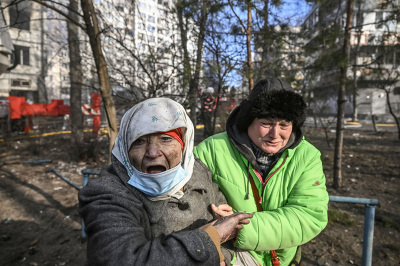How US can be wise in handling Ukraine invasion

Since the start of the Russian invasion, Americans have faced something not experienced in decades. Within Europe, the only example remotely similar to the Ukrainian invasion was in the Soviet incursions into Hungary in 1956 and Czechoslovakia in 1968. Those, however, involved the Soviet military putting down popular uprisings against those communist governments.
In both cases, the United States did not become involved due to the risk of nuclear war with the Soviet Union. The popular uprisings appealed to the United States for support, but first President Eisenhower in 1956 and then President Johnson in 1968, decided not to become involved beyond statements condemning the Soviets. Particularly since the fall of the Berlin Wall in 1989, the United States has not had to face the serious potential of nuclear war in our military actions.
In 1991, the United States used military force to expel Iraqi forces from Kuwait. Then the U.S. used force against Serbia in 1999 to prevent ethnic cleansing in Kosovo. We then fought in Iraq and Afghanistan after 9-11. In none of those cases did the United States face a serious threat of nuclear war. The invasion of Ukraine takes us back to considerations from the Cold War and we must exhibit the wisdom of that time. Let me explain.
First, in writing this article I am personally aware that the images coming from Ukraine are heartbreaking. The naked aggression against the Ukrainian people is infuriating for me to watch. As time has moved forward, we have seen the Russian military’s inability to conduct proper logistics, communicate, and combined arms maneuver. With these failures and ensuing battlefield losses caused by Ukrainians, Russians have quickly resorted to artillery and missiles against civilian targets. We have watched Ukrainian women and children killed while in hospitals and shelters. We have watched President Zelensky cry out for support to America and other NATO nations. Most Americans want to do everything possible to stop the bloodshed and help expel Russia from Ukraine. Many Americans now demand we do more, and even suggest “no fly” zones or even armed incursion into Ukraine.
Before going into wise options to help Ukraine, it’s important to know the nuclear threat we face in confronting Russia. Most estimates put Russia’s nuclear arsenal beyond 6,000. That’s actually more than the U.S. arsenal by almost a thousand. The arsenals of other nuclear powers are in the low hundreds or less (China, for example, has around 300). Russia has developed and successfully tested nuclear-capable hypersonic missiles. These missiles travel at 10-20 times the speed of sound, and therefore likely beyond our anti-missile defense capabilities. In other words, we wouldn’t be able to stop a number of nuclear missiles from hitting us. Russia already used this hypersonic capability against a warehouse near the Polish border, and Putin has made clear his willingness to escalate up to and including nuclear exchange. In the event of a nuclear war, Ukraine would likely be incinerated, and so failure to prevent that escalation would be the worst thing we could do in trying to help Ukraine.
Right now, we are supporting Ukraine in multiple ways that are making a difference. First, we are sending substantial numbers of “Javelin” anti-tank missiles. These have been used to great effect, primarily because the Russians have failed to properly integrate dismounted infantry with their armor. I spent my career as an infantry officer. When I was Mech Infantry, we always operated as a team with Armor. Infantry dismounted to fight against enemy infantry like those using anti-armor devices (like Javelins). Armor would protect infantry from enemy Armor. Russian infantry is not dismounting, and so many Russian tanks and BMPs (infantry carriers) have been destroyed.
We are also supporting Ukraine with other critical weapons, like anti-aircraft missile systems. We are providing resources to sustain the Ukrainians in the field. Finally, we are providing critical intelligence directly to the Ukrainian military. This is likely a reason so many senior Russian officers have been killed over the past few weeks.
A “no-fly zone” would not only start a war between NATO and Russia that includes nuclear weapons, but it would likely not be as helpful as many assume. Most Russian strikes against Western Ukraine have been by missiles from the Black Sea, Russia, or eastern Ukraine. We could only put a no-fly zone in Western Ukraine, but that wouldn’t stop these missile attacks.
What we need to do is show patience with this current support. Additionally, we should focus substantial efforts to pressure China to stop supporting Russia. Chinese President Xi Jinping (and the rest of the CCP) should be held responsible for coordinating this invasion with Putin and continuing their support. If Putin didn’t have China’s backing, he could not have invaded, nor could he continue. Lastly, the Biden administration did a horrendous job in not deterring this invasion. The sanctions will help now, but they could have prevented the invasion if used beforehand. We desperately need new national security and new foreign policy teams.
Ecclesiastes 7:9 tells us, “Be not quick in your spirit to become angry, for anger lodges in the bosom of fools.” In handling this invasion, we must show wisdom, self-control, and patience for our sake, and the sake of Ukrainians.
Bill Connor, a retired Army Infantry colonel, author and Orangeburg attorney, has deployed multiple times to the Middle East. Connor was the senior U.S. military adviser to Afghan forces in Helmand Province, where he received the Bronze Star. A Citadel graduate with a JD from USC, he is also a Distinguished Graduate of the U.S. Army War College, earning his master of strategic studies. He is the author of the book Articles from War.





















